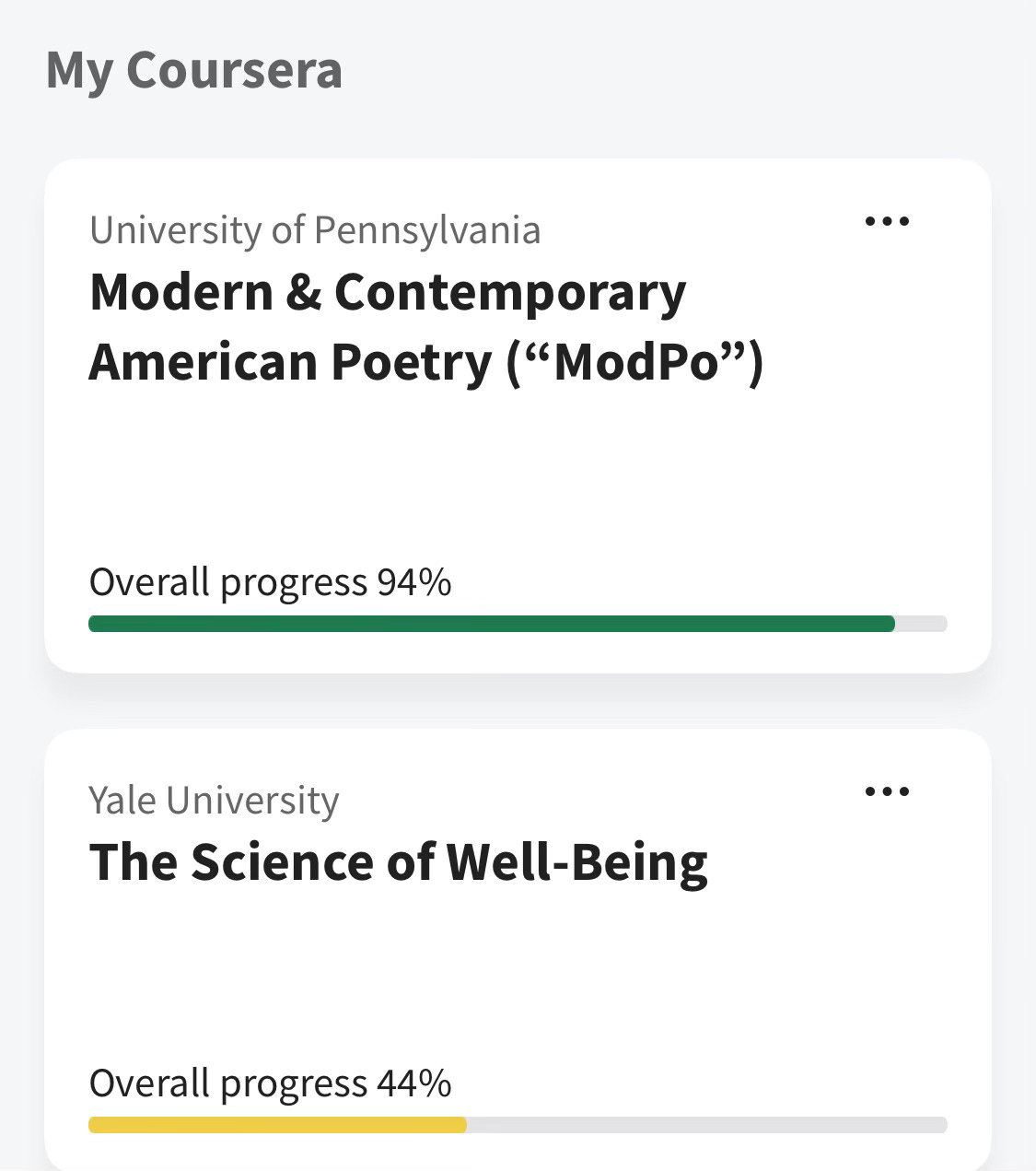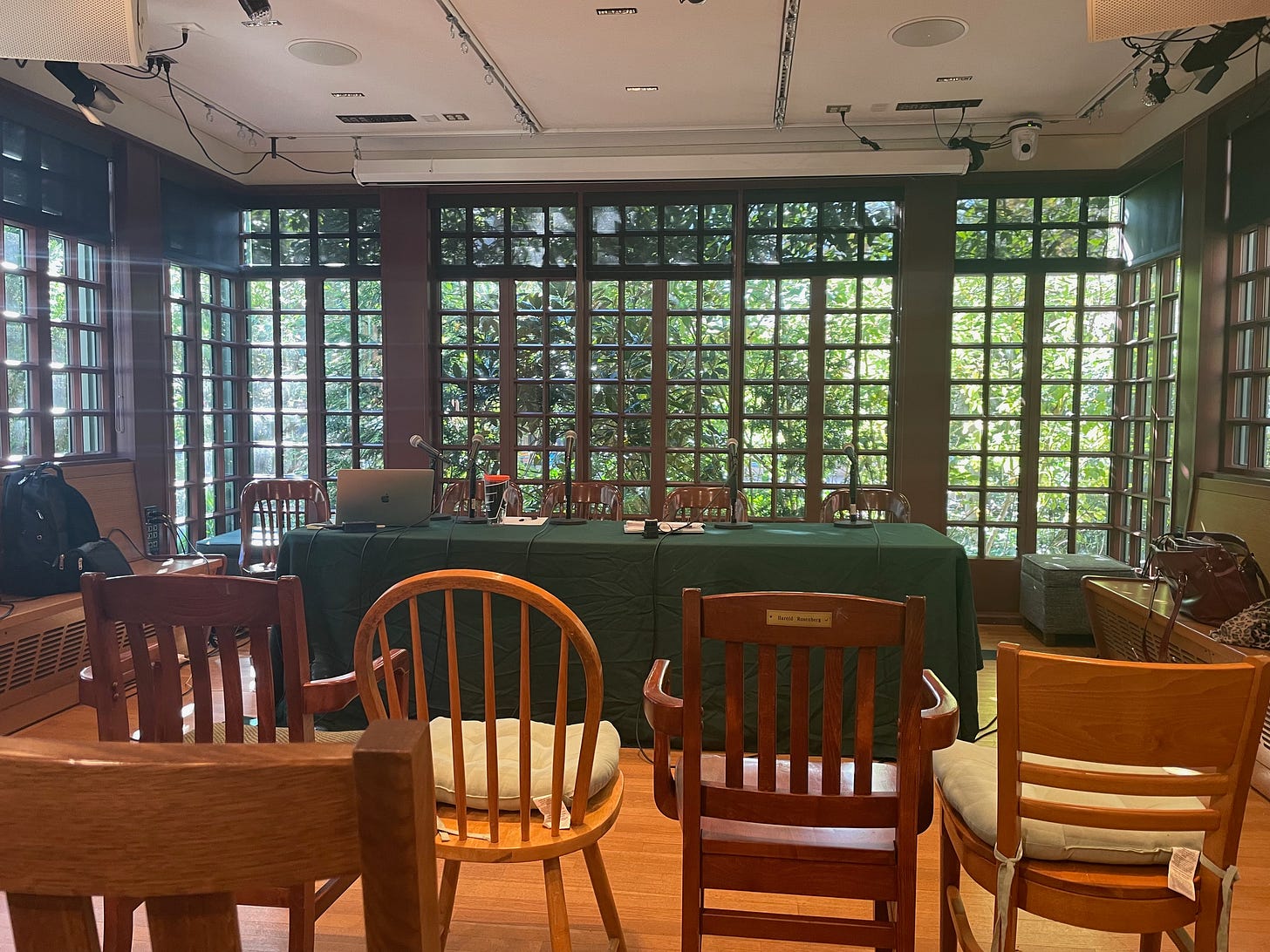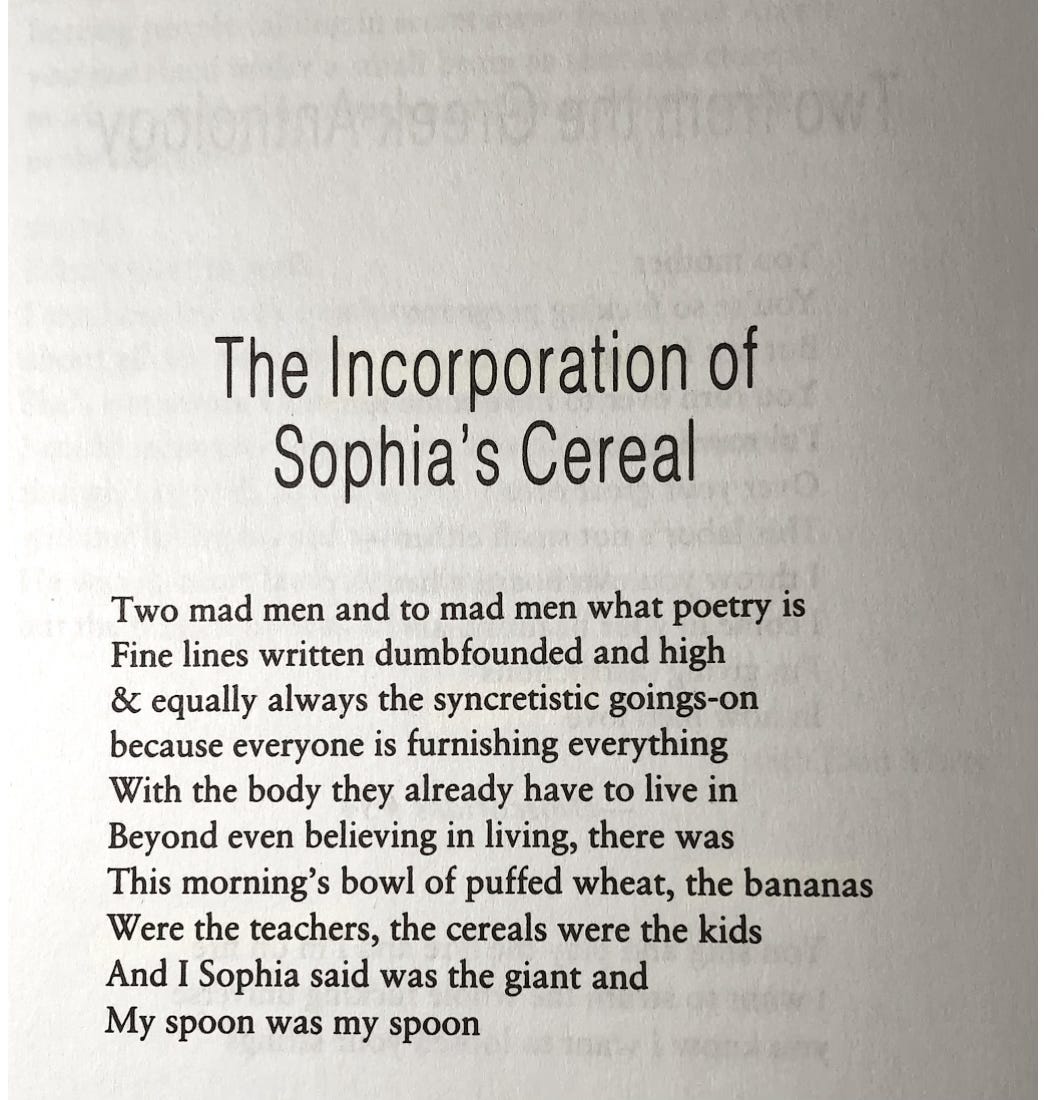My Google newsfeed often fills me with shame. Who is this shallow person who has a more-than-passing interest in “Real” Housewives? What is all this clickbait from “Eat This, Not That,” when I gave up dieting five years ago? Why am I still being shown stories about retail bankruptcies; I stopped researching that book in early 2022!
On the flip side, I do want to know about all things Stephen Sondheim and Steely Dan, travel and books, Southwest Airlines and unruly passengers. Yes, please show me cool tables for small entryways and tell me all your decluttering “secrets.” I am what I Google — and I Google a lot of poetry. Sure, it’s in part because I am sometimes looking for a cool line or two to post with the sunrise photo I share (almost) daily to social media. But I genuinely love poetry. Some of my favorite people are poets!
My poetry Googling habits might be why Google sent me a Philadelphia magazine article in May ‘23 about a course called Contemporary Modern Poetry, aka ModPo. (“Please never say that again,” said an otherwise supportive friend.) The course is free via Coursera, an app I already had on my phone because I attempted to take the famous Yale University course on the science of happiness early in the pandemic. I promptly registered for the fall course.1 Then I promptly forgot all about it until I received an email reminder in mid-August that class was about to start.
Each week begins with a video welcome from the course’s creator, Al Filreis, a professor at University of Pennsylvania. There are live discussions, readings, performances, and video discussions, in which Filreis leads a group of teaching assistants through close readings of poems. We started with Emily Dickinson and Walt Whitman, but the class is intentionally not chronological in structure; Dickinson, for example, returns in week eight.
Coursera told me to expect to spend two-eight hours a week on the class. I figured, well, I’m smart2, if the range is two-to-eight hours, it should take me a total of four. Cue sound of maniacal laughter. I have spent an average at least an hour every day on the coursework. But I kept my quest relatively quiet until now (see the “secret project” alluded to here), the 10th and final week, because I was terrified of not completing the course. You see, every time I open the Coursera app, there’s a helpful progress bar that shows I quit studying happiness when I was 44 percent of the way through the class.
I failed at happiness, that’s just math.
I will not qualify for a certificate in ModPo (sorry, dear friend who hates that coinage) because I declined to do the written assignments/peer reviews, which are optional — unless you want a certificate. I was an active if pedantic participant. (“And what if you read the poem without knowing that background,” I was asked more than once by more than one heroic TA3.) Every now and then, I would start to feel pretty smart — and then I would listen to a discussion among real poets and scholars and realize I was waist-high in the shallow end with water wings, paddling my arms furiously while my feet touched bottom, screaming “I’M SWIMMING, I’M SWIMMING.”
IYKYK
I don’t think I would have made it here to week 10 if it were not for some serendipitous timing. I had the advantage of not having to work on my current novel during the first half of the course; by the time my book returned to me with my editor’s notes, I knew what I had to do to balance the coursework with my “life.”4 It also helped that Twitter was circling the drain this fall. The time I used to spend on social media was re-directed toward poetry.
For participants in ModPo (sorry!) there are several achievements to unlock. Drop in on office hours. (I went almost weekly and one week I went twice.) Participate in the online forums. Of course I did that. (See, “Twitter was circling the drain,” above.) Watch the weekly webcast live and participate via the Youtube chat. (Tricky for me because it often conflicted with my training sessions; I made it to four.) Call in with a question during the webcast, usually recorded at Kelly Writers House at Penn. (Nope.) Actually attend the webcast in person. That I could do.
On October 25 — week 8 and, not incidentally5, Bernadette Mayer Day — I showed up at the Kelly Writers House, one of five people in attendance that day. The others were Michele, a ModPo vet of many years who has earned mentor status; Aiden, who is in contention for Rookie of the Year (no, seriously, there is a Rookie of the Year); and Emily, who had discovered the course only a week ago and already completed weeks 1,2, 7 and 8. Michelle also brought her husband, Bob, who cares nothing for poetry. People — find yourself a partner who will, for the love of you, attend a 90-minute discussion about the “Language Poets” despite not loving poetry. I’ve since had lovely email exchanges with both Michele and Aiden.
The Kelly Writers House, like many celebrities, is smaller in person.
Some ModPo’ers — there I go again — take this course over and over. Will I be one of them? I don’t know. I told my trainer that I think I need to follow this intellectual challenge with a physical one and he agrees, BUT MAYBE HE JUST WANTS ME TO STOP TALKING ABOUT FRANK O’HARA. Still, I aspire to stay connected, to the poems and the people. There were so many lovely discoveries. Gertrude Stein, whom I knew mainly as a contemporary of Baltimore’s Cone sisters, is a far more interesting/important writer than I understood. Kenneth Koch’s “Variations on a Theme by William Carlos Williams” made me laugh out loud, and how often does a poem do that? The inclusion of Jayne Cortez in the syllabus led me to this poem. Also, I now know what “paratactic” means. I think. Maybe. Where did I put my water wings?
My favorite poem — that’s impossible to say. I did become obsessed with “I Know a Man” by Robert Creeley, and I still don’t know why. But my big discovery/crush was the aforementioned Mayer. (It’s a particular kind of melancholy to start reading a genius less than a year after her death.) At the end of class on Oct. 25, when the mic was passed to me — the mic is passed to everyone who shows up— and I was asked what I had learned in ModPo so far, I said that Mayer’s work resonated with me because it makes the discussion about the “pram in the hall” (IYKYK) moot. Mayer’s children are everywhere in her work; they inform it and enrich it. Which is to say, life informs and enriches art.
Here’s just one example.
I signed up for Modern Poetry because I thought it would teach me what makes a poem “good.” Instead, I quickly learned that the point was not to develop a set of aesthetic criteria, but to engage with the words, to conduct — as Filreis says at the beginning of each episode of Poem Talk, an audio resource used in the course — a “close but not too close reading” of the selected poems.
I have long been fond of these lines by W.H. Auden:
“For poetry makes nothing happen: it survives
In the valley of its making where executives
Would never want to tamper, flows on south
From ranches of isolation and the busy griefs,
Raw towns that we believe and die in; it survives,
A way of happening, a mouth.”
Auden is not part of the ModPo curriculum. But I would argue that the way the course teaches us to think and talk about poetry is very much a way of happening, a mouth. The difference is spreading. IYKYK.
Read/reading: Stand back, here is a list of the poets I read in October alone6: Ruth Lechlitner, Genevieve Taggard, Countee Cullen, Claude McKay, Langston Hughes, Gwendolyn Brooks, Robert Frost, Richard Wilbur, X J Kennedy, Allen Ginsberg, Jack Kerouac, Bob Kaufman, Robert Creeley, Anne Waldman, Amiri Baraka, Jayne Cortez, Frank O’Hara, Kenneth Koch, John Ashbery, Barbara Guest, James Schuyler, Bernadette Mayer, Eileen Myles, Hanif Abdurraqib, Patrick Rosal, Lyn Hejinian, Bob Perelman, Charles Bernstein, Emily Dickinson, Susan Howe, Harryette Mullen, Tyrone Williams, John Keene, John Cage, Jackson Mac Low, Jena Osman, Joan Retallack. But also: Small Things Like These, by Claire Keegan.
Re-reading: I found my way back to Scruples, which is horribly, horribly homophobic, not to mention anti-fat, but I will always have a soft spot for the novel I read while stranded in a very scary motel near LaGuardia when I was only 20 years old and on the verge of becoming a kind-of correspondent for CBS News, ever so briefly. IYKYK.7
Me, me, me: Time magazine says I wrote one of the 100 essential mystery novels and who am I to argue? Also, I got recognized in public AND I WASN’T IN A LIQUOR STORE FOR ONCE! I was in the Dollar Store, buying off-brand candy.
Although the materials are accessible year-round, the course is taught “live” for 10 weeks in the fall, with weekly online lectures and Zoom office hours.
Well, I’m not dumb. There’s a big middle ground.
All the TA’s are wonderful, but because of my schedule, I attended the office hours hosted by David Poplar, Ali Castleman, and Davy Knittle.
I have no life.
Mayer was the big find of ModPo for me, the poet who convinced me to dabble in the supplemental syllabus mere weeks after claiming I would never crack open the supplemental syllabus.
Be kind if there are typos here, I had to fight autocorrect so hard while making this list. Autocorrect also tried to change Filreis’s name to “fireless.”
OK, fine, it means If You Know, You Know. And you probably knew, but my mom recently asked me to explain “BTW,” so don’t assume everyone knows these modern coinages. The title of this month’s newsletter is inspired by a song, “Mission a Paris,” by Gruppo Sportivo — pronounced “Par-ee,” so the wordplay kinda works. Kinda. It’s been bouncing around in my head because I reference it in the novel I’m revising. As for my brief entanglement with CBS News, kids division, that was detailed more than 20 years ago when I was profiled by Anthony Mason on CBS Sunday Morning. IFY — never mind.








How perfectly timed is this post! Just yesterday, while spending 7 hours cooped up in the house with my five-year-old granddaughter, I started reading her poetry. She ignored me at first, and then, suddenly, was caught. How I love Creeley's poem, too. And you. xo
It’s still astonishing to me how much I remember of Scruples all these years later. Thanks for making me feel a little less embarrassed about it.